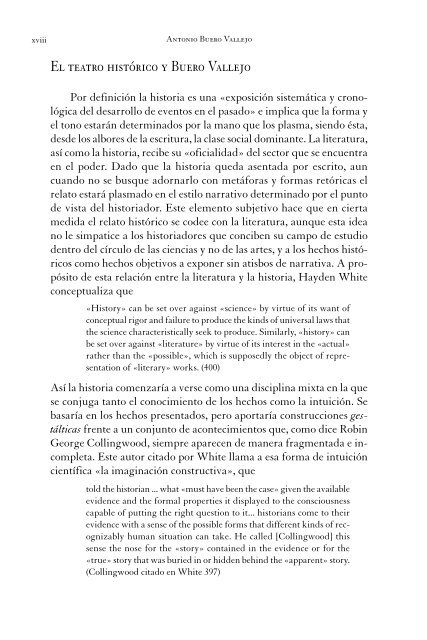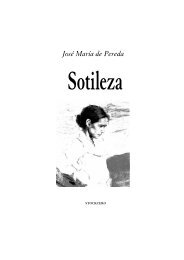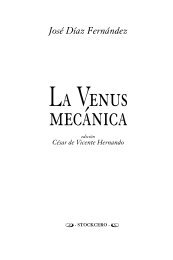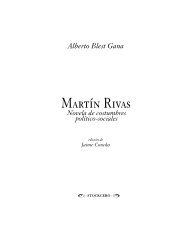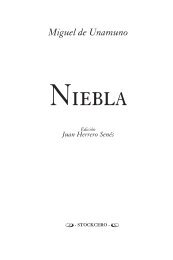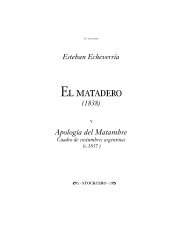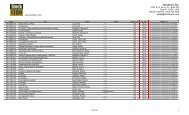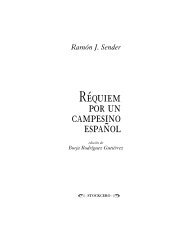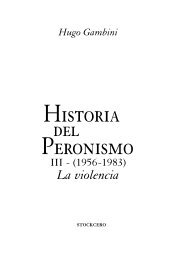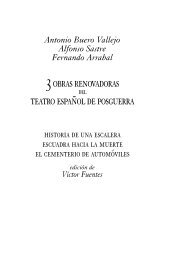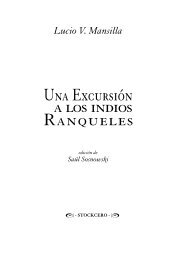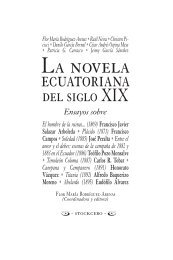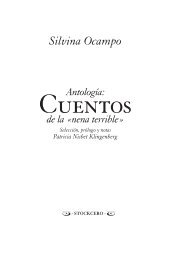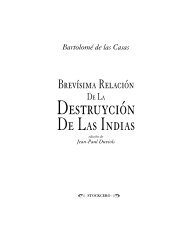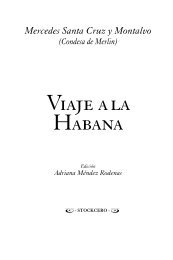You also want an ePaper? Increase the reach of your titles
YUMPU automatically turns print PDFs into web optimized ePapers that Google loves.
xviii<br />
<strong>Antonio</strong> <strong>Buero</strong> <strong>Vallejo</strong><br />
El teatro histórico y <strong>Buero</strong> <strong>Vallejo</strong><br />
Por definición la historia es una «exposición sistemática y cronológica<br />
del desarrollo de eventos en el pasado» e implica que la forma y<br />
el tono estarán determinados por la mano que los plasma, siendo ésta,<br />
desde los albores de la escritura, la clase social dominante. La literatura,<br />
así como la historia, recibe su «oficialidad» del sector que se encuentra<br />
en el poder. Dado que la historia queda asentada por escrito, aun<br />
cuando no se busque adornarlo con metáforas y formas retóricas el<br />
relato estará plasmado en el estilo narrativo determinado por el punto<br />
de vista del historiador. Este elemento subjetivo hace que en cierta<br />
medida el relato histórico se codee con la literatura, aunque esta idea<br />
no le simpatice a los historiadores que conciben su campo de estudio<br />
dentro del círculo de las ciencias y no de las artes, y a los hechos históricos<br />
como hechos objetivos a exponer sin atisbos de narrativa. A propósito<br />
de esta relación entre la literatura y la historia, Hayden White<br />
conceptualiza que<br />
«History» can be set over against «science» by virtue of its want of<br />
conceptual rigor and failure to produce the kinds of universal laws that<br />
the science characteristically seek to produce. Similarly, «history» can<br />
be set over against «literature» by virtue of its interest in the «actual»<br />
rather than the «possible», which is supposedly the object of representation<br />
of «literary» works. (400)<br />
Así la historia comenzaría a verse como una disciplina mixta en la que<br />
se conjuga tanto el conocimiento de los hechos como la intuición. Se<br />
basaría en los hechos presentados, pero aportaría construcciones gestálticas<br />
frente a un conjunto de acontecimientos que, como dice Robin<br />
George Collingwood, siempre aparecen de manera fragmentada e incompleta.<br />
Este autor citado por White llama a esa forma de intuición<br />
científica «la imaginación constructiva», que<br />
told the historian ... what «must have been the case» given the available<br />
evidence and the formal properties it displayed to the consciousness<br />
capable of putting the right question to it... historians come to their<br />
evidence with a sense of the possible forms that different kinds of recognizably<br />
human situation can take. He called [Collingwood] this<br />
sense the nose for the «story» contained in the evidence or for the<br />
«true» story that was buried in or hidden behind the «apparent» story.<br />
(Collingwood citado en White 397)


